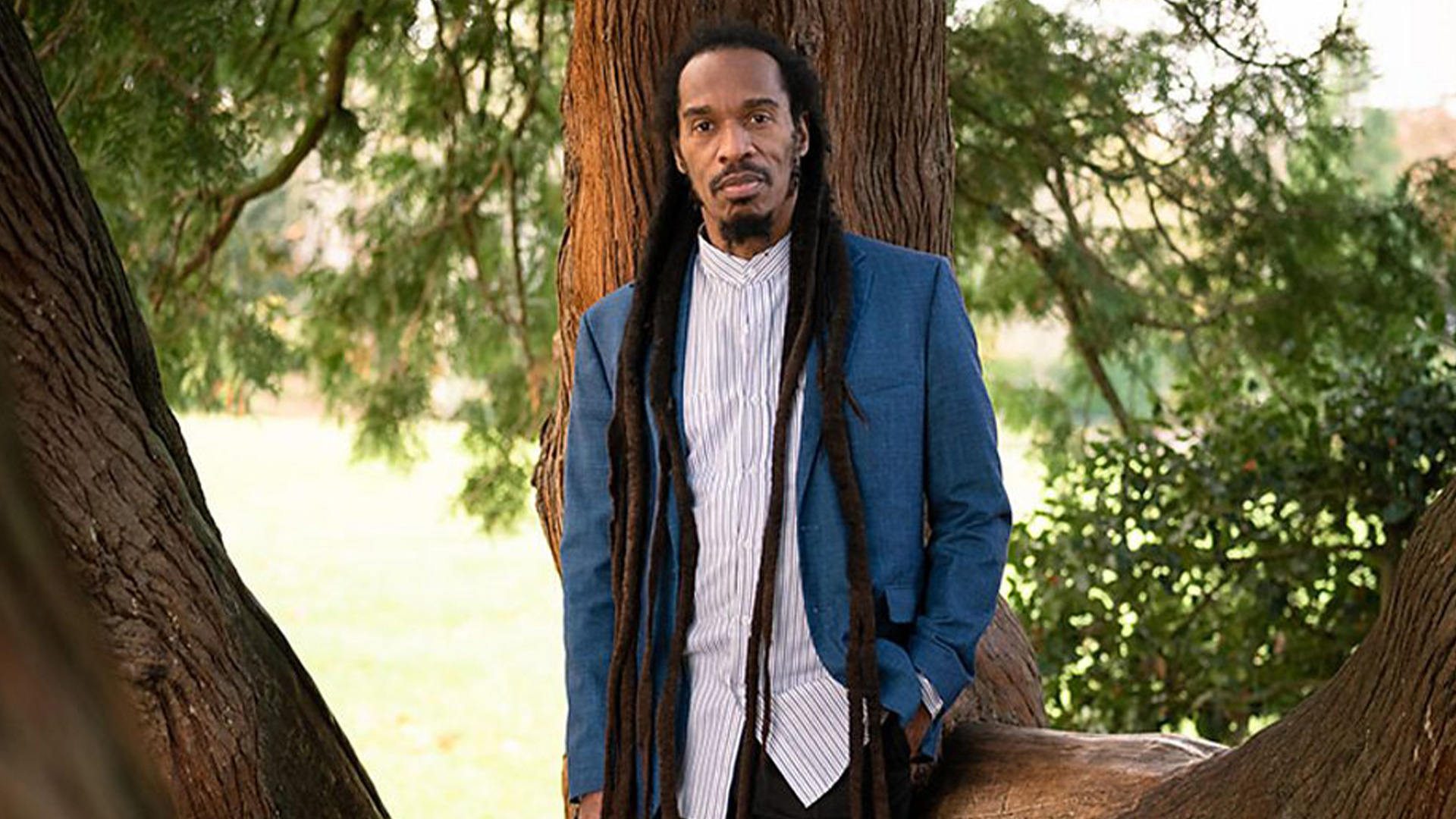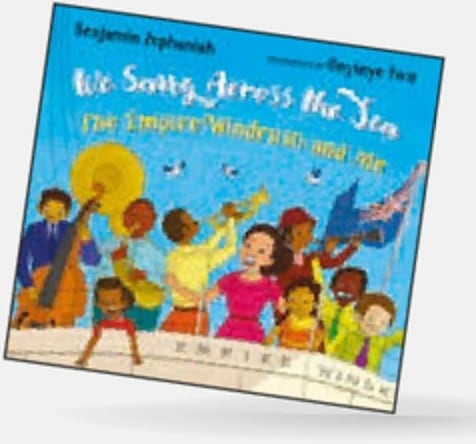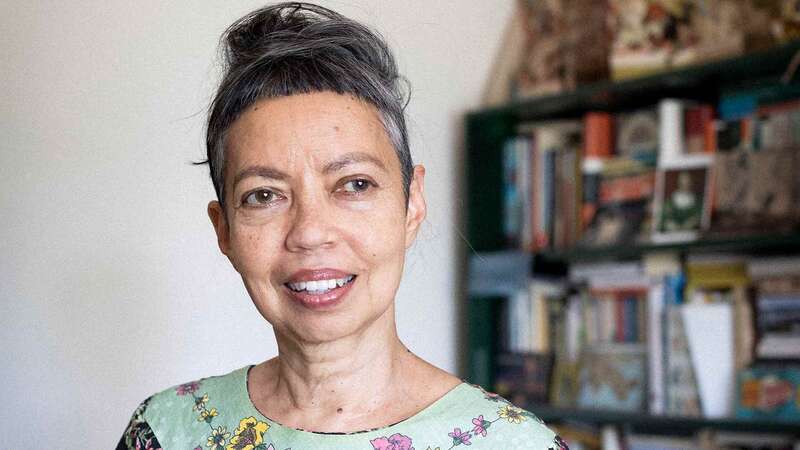You are viewing your 1 free article this month. Login to read more articles.
Benjamin Zephaniah on his new picture book We Sang Across the Sea
 Charlotte Eyre
Charlotte EyreCharlotte Eyre is the former children’s editor of The Bookseller magazine, and current children's books previewer. She has programmed ...more
The latest book by Benjamin Zephaniah follows a Trinidadian woman who boarded the Windrush to pursue her singing dream

Charlotte Eyre is the former children’s editor of The Bookseller magazine, and current children's books previewer. She has programmed ...more
"I told them of all the things in England I would do, if I could sing in England it would be a dream come true.” Benjamin Zephaniah’s new picture book We Sang Across the Sea: The Empire Windrush and Me, out with Scholastic in April 2022, is an uplifting, joyous recounting of the life of Mona Baptiste, the Trinidadian musician who decided to travel to England on the “HMT Empire Windrush” to pursue her dream of being a famous singer.
Scholastic asked Zephaniah if he wanted to write a new Windrush story after the success of 2020’s award-winning Windrush Child (Scholastic), and the poet, author and “Peaky Blinders” actor was very interested in telling the story of the women, a group of people who are not often mentioned when it comes to tales about the Windrush generation.
If the establishment, and by that I mean the political establishment, aren’t going to change, we have to do our best to counter their narrative
There is a story about an unknown woman who hid herself in a cupboard to stow away on the ship, but Zephaniah ultimately settled on Baptiste, a young singer from a comfortable background (she travelled in first class on the Windrush) who travels to further her career.
“Mona breaks stereotypes,” he says. “She’s not one of the men, either the ex-military men who fought for Britain, or one of the people in the Caribbean who thought, ‘I’m going to help rebuild the mother country’. She’s not thinking about coming and working on the trains, on the buses or in the factories. She wants to be a star.”
After arriving in England, Baptiste worked hard to establish herself and eventually worked across Europe—her career spanned Germany, France and Ireland, as well as Britain—and Zephaniah tells her story in a way that reads almost like a song. “Because it’s for children, I like the idea that they can say, ‘I just want to sing, I just want to sing’, and they can sing it… As soon as I started [writing the book] I found that it was taking the form of a song. It has a chorus.”
Illustrator Onyinye Iwu reflects the joy in Baptiste’s story through her busy, colourful spreads, which include the heroine singing on stage, or with a large band, or even just to a bird in a London park. One spread was inspired by a photo of Baptiste that can be seen here; it shows her laughing and holding a saxophone, in front of a group of Caribbean soldiers. The Eiffel Tower makes an appearance, as does a Trinidadian carnival and the beach Baptiste and her sister play on as children. Iwu’s artwork is “perfect”, says Zephaniah.
Iwu said she was attracted to the project for two reasons: she is herself a child of first-generation migrant parents and was inspired by Baptiste’s journey out into the world to seek her fortune; she also appreciated the fact that the book is a story about success.
Often stories about journeys like the one Baptiste undertook are about struggle, but Zephaniah’s story is about a young woman who travels to sing and make music. “That’s totally different from the other stories out there,” Iwu says. “How cool that she was allowed to pursue her dream at such a young age. How many people get the opportunity to do that, even now?”The story of We Sang Across the Sea is instead one of triumph and courage, and anyone who makes similar journeys—whether they are fleeing a country that is war-torn or leaving an area that is ravaged by climate change—has courage, says Zephaniah, reflecting on his mother’s own journey to Britain from the Caribbean. “We didn’t have the connectivity we have now. People of that age can remember, if you wanted to write to the Caribbean, there was no email. You had to go and buy an airmail letter, write it, put it in the postbox, then it got two weeks to get there… When I say to my mother, ‘What did you know about England?’, she knew what she was taught at school. She had one or two contacts when she was coming here. I think it was such a brave thing.”
Both Zephaniah and Iwu are passionate about getting stories of Black history out to young people, something they say is not done properly in schools. “It’s not just people in the Black community and the Asian community who feel that way—white people and particularly young white people want to know the truth about their friends,” says Zephaniah. Publishing and the wider creative industries are moving in the right direction, he says, and were given a kick up the backside by the resurgence of Black Lives Matter, but there is a “profound problem” within the curriculum. “To tell the real, honest truth about the history of Britain would mean changing the history books,” the author says. “It would mean telling the truth about people like Winston Churchill, and I just can’t see that happening…. If the establishment, and by that I mean the political establishment, aren’t going to change, we have to do our best to counter their narrative.”
Iwu is a former teacher as well as an illustrator and entered teaching because she wanted to bring an alternative viewpoint to the current narrative. She too knows there are young people who are catching up a lot faster than those teaching them. They go on social media and find things out themselves, but when they ask teachers about certain aspects of history, the teachers don’t know. Iwu says things are getting better, however. “I hope it’s an onward trajectory and that at some point it gets to the heart of government and education policy is changed. As a lone teacher, there isn’t much I can do.”
As for Baptiste, Zephaniah hopes We Sang Across the Sea will inspire young people to explore her life further. “She made a very good living from singing. She was a Black woman on TV. She made records, you can still listen to her on YouTube. She sang in German. She sang in French. That’s amazing. She had a relatively good life. It had its ups and downs but I wanted to tell a story that would allow people to do their research and find out more about her.”










